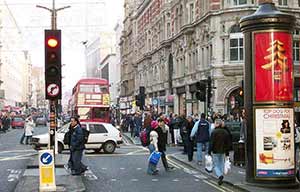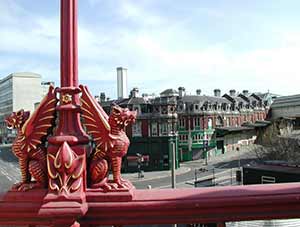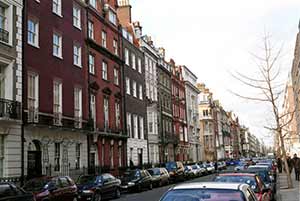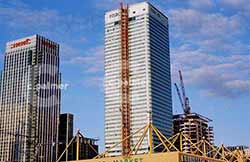|
Fleet Street

Maxim Arisov, 16, Ulyanovsk, asks:
What is Fleet Street famous for?
Fleet Street is located in the middle of the City of London and leads on to Ludgate Hill which goes up to the front of St Paul's Cathedral. St Paul's was designed and built by Sir Christopher Wren after the Great Fire of London in 1666. Fleet Street itself is famous because the main offices of most of the important national newspapers used to be there, although they have now moved to other places around the edge of the city. The term "Fleet Street" is still commonly used to mean the press, i.e. the newspaper industry. The name comes from the River Fleet which runs underneath it in great pipes down to the River Thames.
Fleet Street is not the only place to be used metaphorically to represent an activity. It could be used in a sentence such as: "If Fleet Street got hold of1 this news, they would splash it all over2 the front pages of the newspapers".
Other places include:
Harley Street - a place in London where many eminent doctors have their offices (incidentally, many of the popular examples are from London, because it is such a large and influential city and England is not a very big country).
 Oxford Street - also in London where there are many large (and expensive) department stores. Marks & Spencer, John Lewis, Selfridges, Debenhams, C & A Topman and many others can be found there. Oxford Street - also in London where there are many large (and expensive) department stores. Marks & Spencer, John Lewis, Selfridges, Debenhams, C & A Topman and many others can be found there.
Downing Street or No.10 - where the Prime Minister (PM) lives and has his offices. Actually, the Chancellor of the Exchequer3 also lives there at No. 11 and someone else whom I have forgotten4, but that is all - the remaining houses that used to be there have all been amalgamated5 into these two. When the PM or Chancellor changes, the old one has to leave immediately to make way for the new one! There are doors between the houses so that the PM does not have to go out into the street to talk to his neighbour. When I was a boy, anybody could walk down Downing Street, but now there are big security gates at the entrance. There is always a policemen outside No. 10. Another interesting thing, because our PM has a family and the Chancellor doesn't, they changed living quarters6, but we still call the PM's office 'No. 10'.
The City - the square mile that is the original location of old London and where there are many banks, insurance offices and other financial institutions. You might hear a sentence like: "The City reacted well to the news of a cut in interest rates7."
 Westminster - this used to be a separate town from London, but is now part of the city. It is where the Houses of Parliament are and the name is used to represent the Government. Westminster - this used to be a separate town from London, but is now part of the city. It is where the Houses of Parliament are and the name is used to represent the Government.
Whitehall - this is a street where there are many government departments and the name is used collectively to denote them.
Buckingham Palace - this is where the Queen lives when she is in London. Sometimes people just say 'The Palace' and mean this one, although there are many others.
All these places are in London, but there is one place in the City of York that is also very commonly used - The Shambles. In York, it used to be a narrow street used by the butchers of the town and because it was always so congested8, it became a generic term for anything that is in a muddle9 or largely destroyed.
 When London was much smaller than it is now (but it was still the largest city in the world at that time), there were many markets around the edges. As people did not have refrigerators then, produce was brought in daily from the countryside to feed the Londoners. As the city grew, these markets found themselves boxed in10 by the houses and streets so that it was hard to get the food there in time. So the markets were moved to new places on the edges. When I was a boy, the markets were still in their old places and some of the most famous ones were: When London was much smaller than it is now (but it was still the largest city in the world at that time), there were many markets around the edges. As people did not have refrigerators then, produce was brought in daily from the countryside to feed the Londoners. As the city grew, these markets found themselves boxed in10 by the houses and streets so that it was hard to get the food there in time. So the markets were moved to new places on the edges. When I was a boy, the markets were still in their old places and some of the most famous ones were:
Smithfield - for meat. Originally, the animals were taken alive right to the market, but later only the carcasses11. This has quite gone now as it was very unhygienic and full of flies!
 Covent Garden - for fruit and vegetables. This still exists in its new place called 'New Covent Garden'. In the old place, there is the main opera house, so the term 'Covent Garden' now refers more usually to the opera house than to the market. Covent Garden - for fruit and vegetables. This still exists in its new place called 'New Covent Garden'. In the old place, there is the main opera house, so the term 'Covent Garden' now refers more usually to the opera house than to the market.
Billingsgate - for fish. This was on the edge of the River Thames and I think this has almost gone now12 as refrigeration eliminates the need for it. Years ago, the men there worked as porters, carrying boxes of fish. It was very heavy, wet, cold and dirty work, also infested13 with flies. Only the poorest would do it. Often women would help cleaning the fish, etc. They all had a bad reputation and we still have the expression, "to swear like a Billingsgate fishwife14". Like all markets, if you wanted the best things, you had to get there early. They mostly opened at about 3 or 4 am. The public houses were allowed to open early specially for the workers in those markets.
1 get hold of - суметь схватить
2 splash over - печатать аршинными буквами
3 Chancellor of the Exchequer - канцлер казначейства (министр финансов Великобритании)
4 Редакции SE тоже не удалось вспомнить, кто там еще живет.
5 amalgamated - cоединенный
6 living quarters - жилое помещение
7 cut in interest rates - снижение процентных ставок
8 congested - перенаселенный
9 muddle - беспорядок
10 box in - окружать, огораживать
11 carcass - туша
12 Насколько известно редакции SE, рыбный рынок Billingsgate все еще работает
13 infested - кишащий
14 fishwife - торговка рыбой
Читать еще в этой рубрике:
Читать еще в этом номере:
|
|











